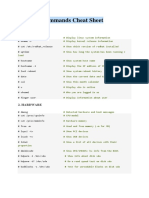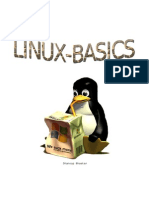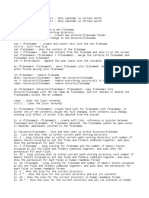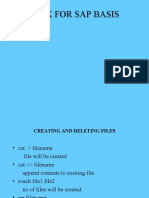0 ratings0% found this document useful (0 votes)
41 viewsBasic Commands
This document provides summaries for various Linux commands:
It lists commands for displaying the date, user information, calendar, system uptime, disk and memory usage, changing directories, searching files, editing files, managing files and directories, copying and moving files, checking processes, managing users, and networking tasks. Common options and examples are provided for commands like ls, cat, grep, cp and ifconfig to demonstrate their functionality.
Uploaded by
imtiyaz beighCopyright
© © All Rights Reserved
Available Formats
Download as TXT, PDF, TXT or read online on Scribd
0 ratings0% found this document useful (0 votes)
41 viewsBasic Commands
This document provides summaries for various Linux commands:
It lists commands for displaying the date, user information, calendar, system uptime, disk and memory usage, changing directories, searching files, editing files, managing files and directories, copying and moving files, checking processes, managing users, and networking tasks. Common options and examples are provided for commands like ls, cat, grep, cp and ifconfig to demonstrate their functionality.
Uploaded by
imtiyaz beighCopyright
© © All Rights Reserved
Available Formats
Download as TXT, PDF, TXT or read online on Scribd
You are on page 1/ 1
date // to display the current date
who // to provide details about currently loggined user
whoami //to display the currently logined user name
man //to provide manual
clear // to clear commands from terminal
pwd // to show present working directory
cal cal 2028 cal 11 2023 // to display calendar
uptime //uptime of system
df //show disk usage
du //show directory space usage
free //show memory and swap usage
passwd / to set/reset password
ls ls -a ls -l ls -al //to show content of files and directories
cat>hello.txt //to create a text file
cat hello.txt //to view content of file
cat>hello.txt //to rewrite into a file
cat>>hello.txt //to append the file
cat file1.txt file2.txt > file3.txt //to add content of two files to single
ctrl +d //to save file content
touch //to create empty file
rm //to remove file or directory
cd cd .. //to change directory
grep pattern filename //to search for a pattern in a file
gedit //to edit the file graphically
mkdir //to create a directory
rmdir //to del empty dir
rm -rf dirname //to del dir w/c is not empty
cp //cp source destination to copy a file
mv //to move the file from one location to another
ps // currently working process
top // all running process
useradd adduser //to add new user
userdel // to del user
redhat-config-network //to open network configuration manager
ifconfig //to check network details
ping id address
service network restart
more filename
head filename //first 10 lines
tail filename //last 10 lines
You might also like
- Unix/Linux Command Reference: File Commands System InfoNo ratings yetUnix/Linux Command Reference: File Commands System Info5 pages
- GNU/Linux Most Wanted: Summary of Most Useful CommandsNo ratings yetGNU/Linux Most Wanted: Summary of Most Useful Commands1 page
- A Comprehensive Guide to Essential Linux CommandsNo ratings yetA Comprehensive Guide to Essential Linux Commands28 pages
- Basic Unix Commands Required For Sap AdministrationNo ratings yetBasic Unix Commands Required For Sap Administration8 pages
- Linux Commands Cheat Sheet - Linux Training AcademyNo ratings yetLinux Commands Cheat Sheet - Linux Training Academy22 pages
- RHCSA Cheatsheet_2757c0bc-b9bd-4fff-b33f-817b3b7d6e9bNo ratings yetRHCSA Cheatsheet_2757c0bc-b9bd-4fff-b33f-817b3b7d6e9b5 pages
- Introduction To Unix/Linux: Operating SystemNo ratings yetIntroduction To Unix/Linux: Operating System7 pages
- Configuration of a Simple Samba File Server, Quota and Schedule BackupFrom EverandConfiguration of a Simple Samba File Server, Quota and Schedule BackupNo ratings yet
- Data Link Layer-III Multiple Access, Random Access, and ChannelizationNo ratings yetData Link Layer-III Multiple Access, Random Access, and Channelization18 pages































































